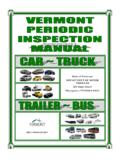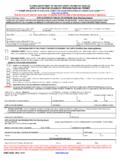Transcription of PUBLIC ACCOMMODATIONS: STATE-BY-STATE
1 Information, Guidance and Training on the Americans with Disabilities Act (ADA) 1419 Mayson Street, Atlanta, GA 30324 404-541-9001 (v/tty) 1-800-949-4232 (v/tty) 404-541-9002 (Fax) Funded by the National Institute on Disability and Rehabilitation Research of the Department of Education #H133A110021 A Project of the Burton Blatt Institute at Syracuse University 1-800-949-4232 (voice/tty) Disability Rights and PUBLIC Accommodations: STATE-BY-STATE Stephen A. Rosenbaum, John & Elizabeth Boalt Lecturer, University of California, Berkeley School of Law; Lecturer, Stanford Law School February 2011 Introduction Many states have their own disability rights laws that complement the Americans with Disabilities Act (ADA). Some states have different definitions of who is protected or what entities are required to comply, as well as different requirements or prohibitions. Some states provide an agency, either mandatory or voluntary, to assist with investigation and enforcement.
2 states may provide different remedies, such as damages or criminal penalties for violations. To the extent that a state law conflicts with the ADA, the state law is preempted by the federal law. Thus, for example, if a state law allows a PUBLIC accommodation to charge a person with a disability extra for bringing a service animal or if it allows a PUBLIC accommodation to charge a person with a disability for the cost of an auxiliary aid, such as a sign language interpreter, that portion of the state law is overridden by the federal law and is not enforceable. However, if a state law provides nondiscrimination requirements or remedies that are similar or additional to the ADA requirements, a person with a disability may use the state law in addition to the ADA. Thus, for example, if a state law includes the same requirement as the ADA but also allows an individual who has encountered discrimination to get compensation, the individual may pursue both the ADA claim and the state law claim.
3 Disability Rights and PUBLIC Accommodations: STATE-BY-STATE Page 2 of 26 Therefore, in determining compliance, it is important for people with disabilities and businesses to understand their state's disability rights laws. This document provides summaries of state disability rights laws covering commercial entities in the eight southeast states (Alabama, Florida, Georgia, Kentucky, North Carolina, South Carolina, Mississippi, and Tennessee) and compares them to Title III of the ADA. Focus areas of the comparison include who is protected, who is covered, general nondiscrimination requirements, rules regarding service animals, and enforcement schemes and remedies. Table of Contents Introduction .. 1 Title III of the ADA .. 3 STATE-BY-STATE Index .. 5 Alabama .. 6 Florida .. 8 Georgia .. 11 Kentucky .. 14 Mississippi .. 17 North Carolina .. 19 South Carolina .. 22 Tennessee .. 25 Disclaimer The Southeast ADA Center is funded by the National Institute on Disability and Rehabilitation Research (NIDRR) of the Department of Education (Grant #H133A110021) to provide information, materials, training and technical assistance on the Americans with Disabilities Act (ADA).
4 However, you should be aware that NIDRR is not responsible for enforcement of the ADA. For more information or assistance, please contact the Southeast ADA Center via its website at or by calling 1-800-949-4232 (v/tty) [AL, FL, GA, KY, MS, NC, SC, TN] or 404-541-9001 (v/tty). The information, materials, and/or technical assistance provided are intended solely as informal guidance, and are neither a determination of your legal rights or responsibilities under the ADA, nor binding on any agency with enforcement responsibility under the ADA. The Southeast ADA Center does not warrant the accuracy of any information contained herein. Any links to non-Southeast ADA Center information are provided as a courtesy and are not intended to nor do they constitute an endorsement of the linked materials. Disability Rights and PUBLIC Accommodations: STATE-BY-STATE Page 3 of 26 Title III of the ADA1 Title III of the federal ADA prohibits discrimination against people with disabilities by places of PUBLIC accommodation .
5 A person with a disability is someone with a physical or mental impairment that substantially limits one or more major life activities. (28 CFR ) There are 12 categories of PUBLIC accommodations covered under Title III (28 CFR ): Inns, hotels, motels and other places of lodging2 Restaurants, bars and other places serving food or drink Movie theaters, playhouses, concert halls, stadiums and other places for exhibitions or entertainment Auditoriums, convention centers, lecture halls and other gathering places Bakeries, grocery, clothing and hardware stores, shopping centers and other sales or rental establishments Laundromats, dry-cleaners, banks, barber and beauty shops travel and shoe-repair services, funeral parlors, gas stations, pharmacies, professional offices (lawyer, accountant, insurance, health care provider) and other service establishments Terminals, depots and other PUBLIC transportation stations Museums, libraries, galleries and other places for PUBLIC displays or collections Parks, zoos, amusement parks and other places of recreation Schools (nursery, elementary, secondary, undergraduate and private postgraduate)
6 & other places of education Day care and senior centers, homeless shelters, food banks, adoption agencies and other social service centers Gyms, health spas, bowling alleys, golf courses & other places for exercise or recreation. 1 Title III of the ADA is at 42 United states Code (USC) 12181-84. The ADA Title III regulations (28 Code of Federal Regulations (CFR) Part 36) and the ADA Standards for Accessible Design, as amended, are available on the Department of Justice ADA website Citations to the relevant sections are given for ease of reference. 2 Except for lodging places located within a building containing five or fewer rooms for rent or payment, which is also occupied by the owner and is his or her residence. 28 CFR Disability Rights and PUBLIC Accommodations: STATE-BY-STATE Page 4 of 26 Title III prohibits exclusion and other forms of discrimination on the basis of disability, and requires covered entities to reasonably modify their policies, practices and procedures to allow people with disabilities to participate.
7 One type of required policy modification is to allow service animals entry to PUBLIC accommodations. (28 CFR (c)) The ADA, as amended, states that a service animal is any dog (or miniature horse) that is individually trained to do work or perform tasks for the benefit of an individual with a disability, including a physical, sensory, psychiatric, intellectual, or other mental disability. (28 CFR ) A service animal is not required to be licensed or certified by a government or other entity or to wear identification or equipment ( , vest or harness). A PUBLIC accommodation may not charge a person with a disability extra for bringing a service animal. (28 CFR (c)(6) & (8)) Title III also requires covered entities to ensure their communication with people with disabilities is as effective as their communication with others, by providing auxiliary aids and services. (28 CFR ) Covered entities are required to make their physical facilities accessible according to the ADA Standards for Accessible Design, with the required level of accessibility depending on whether the facility was built or altered before or after the effective date of the law (March 15, 2012 for new construction and alterations).
8 (28 CFR 36 .304-305, ) Title III is enforceable by private individuals with disabilities in court (there is a "private right of action"). Individuals can file complaints with the Department of Justice, but they are not required to do so. In court, individuals can get injunctive relief (a court order to fix the problem, stop discriminating, or take affirmative steps), but cannot get compensation, or damages, for discrimination under Title III. There are no criminal penalties or punitive damages available under Title III. The Department of Justice can impose civil penalties. Individuals who file lawsuits under Title III can recover their attorney's fees if they win. Disability Rights and PUBLIC Accommodations: STATE-BY-STATE Page 5 of 26 STATE-BY-STATE Index Alabama o Protected Class: o Rights: o Covered Entities: o Service Animals: o Enforcement and Remedies: Florida o Protected Class: o Rights: o Covered Entities: o Service Animals: o Enforcement and Remedies: Georgia o Protected Class: o Rights: o Covered Entities: o Service Animals: o Enforcement and Remedies: Kentucky o Protected Class: o Rights: o Covered Entities: o Service Animals: o Enforcement and Remedies: Mississippi o Protected Class: o Rights: o Covered Entities: o Service Animals: o Enforcement and Remedies: North Carolina o Protected Class: o Rights: o Covered Entities: o Service Animals: o Enforcement and Remedies: South Carolina o Protected Class: o Rights: o Covered Entities: o Service Animals.
9 O Enforcement and Remedies: Tennessee o Protected Class: o Rights: o Covered Entities: o Service Animals: o Enforcement and Remedies: Disability Rights and PUBLIC Accommodations: STATE-BY-STATE Page 6 of 26 Alabama The Alabama legislature adopted a building code in 1965 with the intent to make all PUBLIC buildings and facilities accessible to, and functional for, the physically handicapped to, through and within their Ala. Code 21-4-1 (West s 2010). A decade later, it approved a Handicapped Persons Code, declaring the policy of this state [is] to encourage and enable the blind, the visually handicapped and the otherwise physically disabled to participate fully in the social and economic life of the Ala. Code 21-7-1. Protected Class: For purposes of building accessibility, the statute protects persons who are blind, visually handicapped and otherwise physically disabled, including those who have nonambulatory disabilities, semiambulatory disabilities, sight disabilities, hearing disabilities, disabilities of incoordination and aging.
10 Ala. Code 21-4-1. For purposes of other rights, the Handicapped Persons Code protects people with vision disabilities and other physical disabilities. Ala. Code 21-7-1. Rights: Persons who are blind, visually and otherwise physically disabled have the right to full and free use3 of streets, highways, sidewalks, walkways, PUBLIC buildings, PUBLIC facilities and other PUBLIC places. They are also entitled to full and equal accommodations, advantages, facilities and privileges of all common carriers and PUBLIC modes of transportation and places to which the general PUBLIC is invited. Ala. Code 21-7-2 to 21-7-3. Covered Entities: A PUBLIC accommodation or place includes streets, highways, sidewalks, walkways; common carriers and PUBLIC transit; PUBLIC buildings and facilities; hotels, motels, lodging places and places of amusement or resort. Ala. Code 21-7 -2 to 21-7 -3. 3 ..[T]he same right as the Ala.






